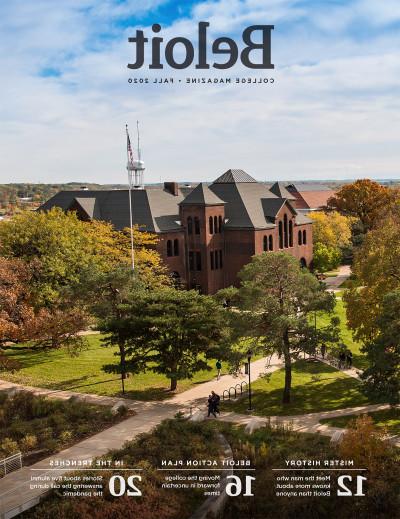Helping Students Succeed in a New Reality
What do you do when the hub of a supportive community suddenly has to shut down because of a pandemic, a time when such a place has never been more important? If you’re DeVon Wilson’90, you make some quick turns, you lean in, and you face the challenge with creativity and positive leadership.
Wilson directs the Center for Academic Excellence at the University of Wisconsin-Madison, a part of the College of Letters & Science, the largest school on campus.
He describes the CAE as “a high-touch advising, academic support, leadership development center,” which serves primarily first-generation, low-income, and underrepresented undergraduates with a high level of talent. The center’s midst-of-campus location is the physical heart of this community, where students form ties with advisors and one another.
But in March, the center was forced to close when the university shifted to remote learning. The move to online education affected some students more than others, with many moving home to stressed environments. Parents were often working on the frontlines and households lacked resources. Moving home often meant students were caring for siblings.
“A lot of these students came to college so they could focus on their education,” he says. “This is the essence of the social capital equity gap, where parents with means and people with experience can navigate these things much easier. These students have become another resource in the household at the same time they’re trying to pursue their education.”
Wilson and his staff had to move quickly to replicate the center’s support model at a distance, while also concentrating on bringing in new students who would be enrolling without the benefits of a traditional orientation.
“I told my staff early on: This is reality,” he says. “How do we make it work? We can talk all day about what’s wrong with it, but what can we do to make this work?”
Through student surveys, his office learned what continuing students were up against. They sent care packages, emails, and launched a series on Instagram. They advocated at the university level for keeping an equity lens on decision making. They put together a “virtual street team,” a group of undergraduates who developed programming to engage new students over the summer. They ended up bringing in one of the largest cohorts of students the program has had yet.
From March through the summer, Wilson and his staff made sure students knew they were supported.
“We kept updating them with communications,” he says. “We let them know the ways they could connect. In this time, I think that’s critical as we’re trying to retain students who are historically underrepresented in higher education. They need to feel your presence.”
Before Wilson joined the university in 2006, he spent nearly a decade working for Beloit after graduating, first in Admissions, then in the federally funded Trio programs, including the McNair Scholars Program, which aims to diversify the next generation of scholars and researchers.
At Beloit, Wilson says he learned how important relationships are in higher education, and how different elements of a small college work together for the good of the whole. That knowledge came into play during the pandemic and also helped him navigate the transition to a leadership post at a large university.
Wilson, who was a first-generation college student himself, may have moved on from Beloit, but he took quite a bit of the college with him, including what he calls “a village of mentors,” whose wisdom still guides his work every day—during a pandemic, or not.
Bill Flanagan, Beloit’s former dean of students, is one of them. “He did not just see you for who you were, he saw you for what you could be,” Wilson says of Flanagan. “And that is a framework that has driven me in terms of how I build organizations and how I think about what people can do.”
Read more stories about alumni working “In the Trenches in the Time of Covid”.





